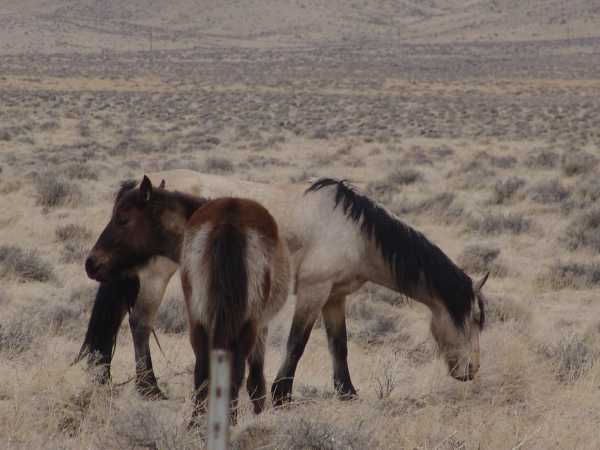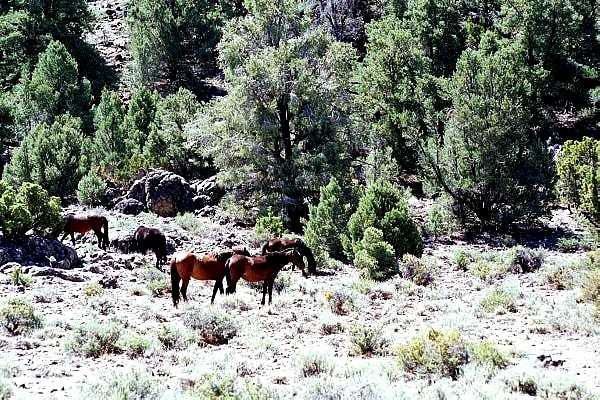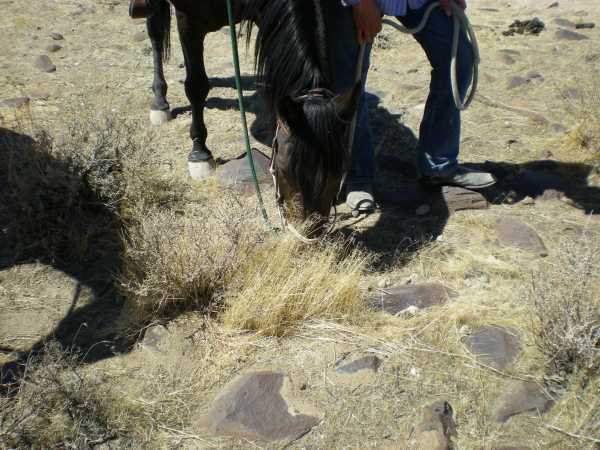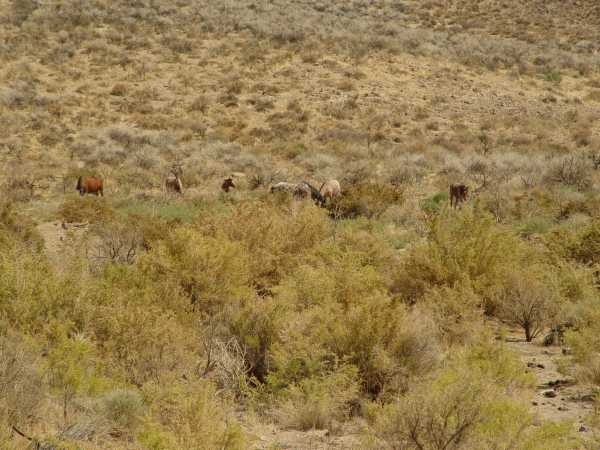|
Crooks and Liars
|
|
New Nevada Agriculture Director
Takes Aim at Wild Horses
Part Five
|
More lies on Television
The following statements were taken verbatim from the
KTVN News web site, posted on April 11, 2008.
Nevada's new agriculture chief says the Virginia Range is dying and there isn't enough money to buy hay to feed the horses that live there.
News that the Virginia Range is dying is certainly news to everyone who lives there, travels there or engages in field work there. This allegation is clearly not supported by any facts. Sample photos of the range have been posted previously in this report. Additionally, the wild horse groups - not the state - provide emergency hay should supplemental feeding be warranted. A photo of the 2007/08 hay cache has also been previously posted.
Typical view of alleged "starving horses" on the "dying range," snoozing near Route 341.

Tony Lesperance says there is a big difference between wild horses and the ones that roam the area.
Mr. Lesperance can't explain the "big difference" as none exists. (Please also see photos posted on the prior pages of this report.)
A couple of the so-called "not wild" horses.

"You've got to respect the fact that once you overpopulate any area to the point you've ruined it, you've in fact done a tremendous amount of environmental damage," says Lesperance.
Interesting statement but not relevant to the Virginia Range horse issue since the preponderance of the range is healthy.
One of thousands of recent photos of horses in the Virginia Range.

It damages (sic) he says takes centuries to recover from because grass eaten will return as cheatgrass the next year.
OK, let's try to figure this one out. If a horse eats, say, Indian ricegrass or Thurber's needlegrass it comes back as cheatgrass? That science simply doesn't work.
When one studies the areas grazed by horses at the end of the peak forage season using the line-intercept method, the researcher will discover at least a half dozen grass species growing around sagebrush and other areas where the soil has sufficient organic material. When one looks at a boundary fence where horses range on one side and cattle range on the other, the horse side typically reveals about 30% more native grasses. The horse's nomadic grazing habits cause him to nibble and then move to the next bunch of grass. This is how the horse, not having the same digestion as a cow, consumes enough variety to sustain a balanced diet. Horses originally evolved in North America which is why they are so successful. Disbursed nomadic grazing is compatible with range vegetation and is why horse range is seldom denuded unless the horses' instinctive behaviors are disrupted by external forces such as those caused by humans.
(We'll get a photo showing what cattle have done to this same range later this week.)
There are so many horses they're eating bark off of trees giving them no nutrition at all. "The perennial grass has been totally eliminated. It's been replaced by annual grass, cheat grass, they graze all that off as fast as it comes up. They graze all the shrubs."
Horses occasionally chew bark of certain trees in when they need vitamin C. Field samples show Director Lesperance's claim that "the perennial grass has been totally eliminated" to be a complete lie. And if the horses graze all the shrubs, what are those tens of thousands of shrubs doing out on those sections of range where horses are present but cattle are not being run?
A volunteer lets his horse graze on some of the nonexistent perennial grasses.

Wild horses grazing among nonexistent shrubs.

Lesperance stresses the animals are not wild, but formally owned horses.
That statement is so bizarre that it defies explanation. The horse and wildlife volunteers have observed these animals in successive generations since the 1950s when volunteers and wildlife groups began keeping track of the Virginia Range herd.
If Director Lesperance isn't anything less than a taxpayer supported professional liar, then the elderly man must be going senile. Nobody can recall witnessing such a fullisade of what can be best described as horse manure from a Nevada state department head.
The spirit of Thomas Paine lives

| 





